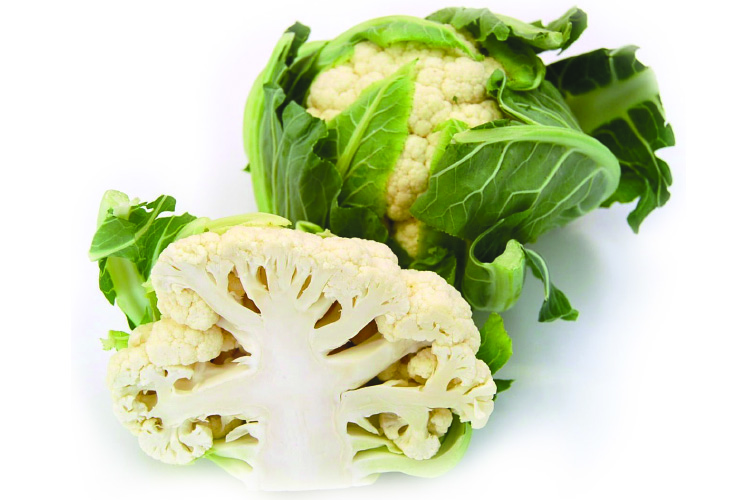Botanically, cauliflower is a member of the cruciferous or brassicaceae family; from the “white” family in terms of fruits and vegetables. Included in this group are other natural foods such as bananas, mushrooms, onions, and garlic. It has got similar nutritional and phyto-chemistry profile with broccoli and cabbage. The cauliflower went through many transformations and reappeared in the Mediterranean region, where it has been an important vegetable since 600 B.C.
- Cauliflower is very low in calories. 100 grams of fresh cauliflower has only 26 calories. It is also very low in fat and contains no cholesterol
- Contains good amounts of many essential B-complex group of vitamins such as folates, pantothenic acid (vitamin B5), pyridoxine (vitamin B6) and thiamin (vitamin B1), niacin (B3) – vitamins which are essential for the body to replenish and required for fat, protein and carbohydrates metabolism
- Cauliflower also provides fibre which prevents constipation
- Contains a substance called allicin (also present in onion and garlic), which helps prevent heart attack, risk of strokes, and other cardiovascular diseases
- Has high amounts of vitamin K and omega-3 fatty acids, which help decrease inflammation-mediated diseases such as arthritis, obesity, diabetes mellitus, inflammatory bowel disease and ulcerative colitis
- Cauliflower contains several anti-cancer plant sterols such as indole-3-carbinol which appears to function as an anti-estrogen agent
- A good source of phytonutrients such as sulforaphane and isothiocyanate, which can help the liver to neutralise toxic substances that cause cancer. Studies show that cauliflower, like other cruciferous vegetables, can reduce the risk of lung, colon, breast, ovarian, prostrate, and other cancers
- Research has shown that the vitamin C in cauliflower can help reduce the wheezing in children suffering from asthma
- The fibre content of cauliflower is nearly 12 grams in every 100 calories – a great choice for digestive system support
- A very good source of vitamin C and manganese, both powerful antioxidants. In fact, 1 cup of boiled cauliflower can give you 55 mg of vitamin C
- Contains good amounts of many essential B-complex group of vitamins such as folates, pantothenic acid (vitamin B5), pyridoxine (vitamin B6) and thiamin (vitamin B1), niacin (B3) – vitamins which are essential for the body to replenish and required for fat, protein and carbohydrates metabolism
















